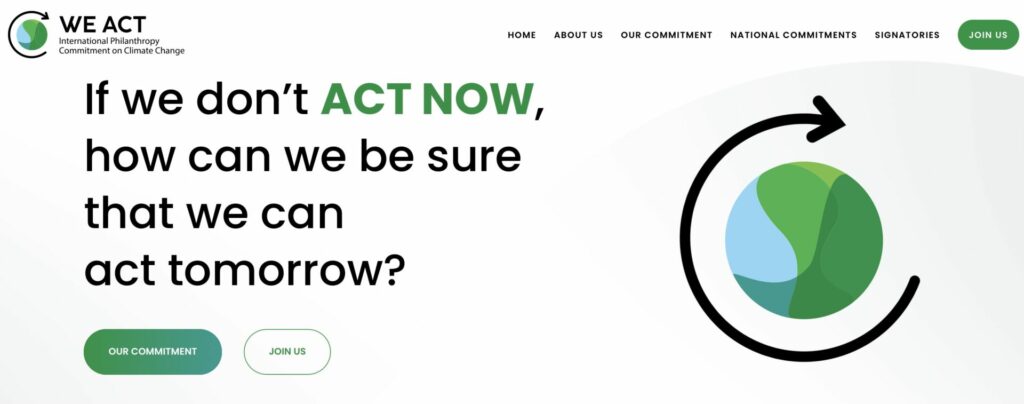The International Philanthropy Commitment on Climate Change: Mobilising foundations around climate
By Third Sector Foundation of Turkey (TUSEV)
Co-created by a global Climate Task Force and hosted by WINGS (the Worldwide Initiatives for Grantmaker Support), the International Philanthropy Commitment on Climate Change recently started accepting signatures. The Commitment, which is a call to all foundations, regardless of their mission, status or geographic location to come together and signal their commitment to climate action, covers 7 action areas: education & learning, commitment of resources, integration, endowments & assets, operations, influencing & advocacy, and transparency.
With an aim to disseminate current trends and practices in philanthropy to a larger audience in Turkey, as part of the Philanthropy Infrastructure Development Project, Third Sector Foundation of Turkey (TUSEV), Dafne’s Turkish member, prepared an interview focusing on the stakeholders’ ideas and reflections on the Commitment. Please find the interview, which consists of valuable contributions from Isabelle Le Galo from Carasso Foundation, Dr Lars Grotewold from Stiftung Mercator and Max von Abendroth from Dafne & European Philanthropy Coalition for Climate, below.
This interview covers the following topics:
- The importance of the International Commitment for the sector
- Implementing the International Commitment
- What the Commitment offers to the sector
- Suggestions for potential signatories
- The impact investment strategy of the International Commitment

Could you tell us a bit about your motivation to support the Philanthropy Coalition for Climate and the International Commitment? What difference could you see such a commitment making across the philanthropy sector?
Isabelle Le Galo, Carasso Foundation: Two years ago, we realised at the EFC Annual Conference, listening to different speakers and roundtables, that the philanthropy sector was activating very little funds worldwide on environmental issues. At the same time, the severity of the climate crisis, the scientific documentation of its impacts and risks and the influence these have on any other social cause, could not be bigger and more worrying. It seemed urgent that a sector dedicated to the common good and crucial social issues came together to tackle the biggest and most transversal challenge we are currently facing.
That’s when we decided to contribute from our foundation to a movement within the philanthropic sector that would be both inspiring and easy to join; effective in putting in motion all of the philanthropic organisations to make sure each of us would be climbing our part of this huge mountain. Back then, British foundations made the same observation and ACF launched the Funder Commitment on Climate Change – a very clear and short text to get foundations to commit. Along with other French and Spanish foundations, this idea of a “pledge” seemed to us to be an excellent lever for mobilising the philanthropic sector. This is why, with the Centre Français des Fonds et Fondations (CFF) and the Asociación Española de Fundaciones (AEF), we have worked on building the French and Spanish coalitions. We presented our ideas and first actions at the PEXforum in Madrid in January 2020 and received an enthusiastic welcome from Max von Abendroth, Executive Director of Dafne, along with his team and representatives of European philanthropic actors present at the venue. Max and his team took the lead to build a strong community of practice around climate change in the European philanthropic sector and then initiated with WINGS, the International Philanthropy Commitment on Climate Change.
In order to make these commitments effective and ensure they reach a level of results that goes beyond the signature of a common document or a simple public statement, we, as a grant-making foundation, decided to support these four geographic levels of the #PhilanthropyForClimate movement. Indeed, it is crucial that these initiatives have resources for HR, communication and coordination. In addition, it is crucial that each level facilitates, through the development of an effective toolkit and a community of practice, the transition of all the foundation signatories of national or international #PhilanthropyForClimate commitments. These are the two practical objectives on which we are working in each regional coalition.
What is #PhilanthropyForClimate?
#PhilanthropyForClimate is a global movement of foundations committed to taking urgent action on climate change, which includes signatories of national and the international philanthropy commitments on climate change.
Dr Lars Grotewold, Stiftung Mercator: The International Commitment is a crucial tool to raise awareness across the philanthropic sector about the urgency and the interconnectedness of the climate crisis – and to support foundations on their way towards stronger engagement on this fundamental issue. It motivates foundations to think about their way into the climate issue and gives guidance to what can be done by every single foundation, no matter on what they work.
The fundamental truth is this: unabated, climate change will erode the basis of every philanthropic activity! Because climate change impacts every aspect of human life. It will destroy the homes and livelihoods of millions of people, it will have detrimental effects on human health – and it will disproportionately affect communities who are already marginalised. Climate change will massively amplify existing inequalities and create destructive stress for our political, social and economic systems. That means: whatever societal problem your foundation is trying to change for the better – you won’t succeed if you don’t factor in climate change.
Every foundation, thus, needs to address the risk climate change is posing to their topic of choice and the opportunities of integrating climate mitigation into their theories of change. If this is done in a systematic way, it will make a huge difference to what you are trying to achieve in your particular field – and the collective action of many different actors from many different fields will make a huge difference for combating climate change. The International Commitment opens up a room for conversations on how every foundation can be part of the solution to the climate crisis.
“The International Commitment is a crucial tool to raise awareness across the philanthropic sector about the urgency and interconnectedness of the climate crisis – and to support foundations on their way towards stronger engagement on this fundamental issue”
Dr Lars Grotewold, Stiftung Mercator
Max von Abendroth, Dafne & European Philanthropy Coalition for Climate: Inspired by the UK Funder Commitment launched in November 2019, we discussed in January 2020 at the 1st PEXforum in Madrid the need for climate action throughout the philanthropy sector Max von Abendroth, Dafne & European Philanthropy Coalition for Climate: Inspired by the UK Funder Commitment launched in November 2019, we discussed in January 2020 at the 1st PEXforum in Madrid together with 150 colleagues from Philanthropy Support Organisations across Europe the need for climate action throughout the philanthropy sector.
I was impressed by the UK climate commitment that has proven to be a welcomed low barrier entry for foundations to introduce a climate lens to everything they were doing.
The International Commitment has evolved considerably from these initially European-focused conversations in Madrid. At this time, ACF has already launched the UK Funder Commitment and Marie-Stéphane Maradeix, Director of the Fondation Daniel et Nina Carasso in France, had written a call to action to the wider field to “show their leadership in designing a framework for the next ten years” and create ‘a philanthropic coalition for climate emergency and social justice’. Such conversations spurred us on at Dafne to set up climate-focused peer groups and eventually established the Philanthropy Coalition for Climate. The Spanish (AEF), French (CFF) and Italian (Assifero) associations of foundations set up national commitments in Spain, France and Italy respectively. In 2020, Global Dialogue scoped out the interest in either a European or international commitment for foundations on climate – from here, it transpired that a commitment at the global level would be most helpful.
The International Philanthropy Commitment on Climate Change (International Commitment) as it stands today represents the collaboration of a global task force made up of over 40 foundation networks and philanthropy support organisations from 21 countries around the world and representing around 22.500 foundations. This task force, hosted by WINGS, co-created a commitment text that would resonate with their diverse networks and membership and of which we are very proud. We continue to work closely with WINGS that today hosts the International Commitment and the Philanthropy Coalition for Climate acts as its European Champion, promoting the International Commitment and supporting its implementation within Europe.
The International Commitment is a framework for climate action covering all aspects of foundations’ work – from operations to programmes, from staff to endowments and assets. I strongly believe that if all foundations, regardless of geographical location and size, and independently of their missions, were to integrate a climate lens across their work this would have a significant and catalytic impact on the climate crisis and deepening inequalities that we see across the world. To turn this vision into a reality, we need to act now and with sufficient urgency.
“I strongly believe that if all foundations, regardless of geographical location and size, and independently of their missions, were to integrate a climate lens across their work this would have a significant and catalytic impact on the climate crisis and deepening inequalities that we see across the world. To turn this vision into a reality, we need to act now and with sufficient urgency.”
Max von Abendroth, Dafne & European Philanthropy Coalition for Climate

What is the International Philanthropy Commitment on Climate Change?
The International Philanthropy Commitment on Climate Change is a framework which offers guidance and a starting point for foundations’ climate action. The International Commitment covers 7 pillars: Education & Learning – Commitment of Resources – Integration – Endowment & Assets – Operations – Influencing & Advocacy – Transparency. The International Commitment is hosted by WINGS and championed in Europe by the European Philanthropy Coalition for Climate.
How do you plan to implement policies mentioned in the Commitment? How have you already integrated a climate lens across your work? Do you have any strategies regarding the process?
Isabelle Le Galo, Carasso Foundation: Since its creation, the Foundation has been committed to climate and environmental issues through its Sustainable Food programme, which promotes universal access to healthy food that respects people and ecosystems. From 2010 to 2020, we subsidised more than 600 field, research and advocacy projects, mainly in France and Spain, for more than €46,5m. In 2015, as part of the COP 21 in Paris, our foundation was one of the first French signatories of the Divest Invest initiative, and of the “4 per 1000” initiative on soil carbon sequestration.
In 2019, we did our first carbon footprint assessment, in our Sustainable Food program, we have actively been participating in several philanthropic initiatives such as co-leading a dedicated climate working group in the Global Alliance for the Future of Food, co-steering discussions with other European funders and joining forces for instance with the European Climate Foundation and Porticus Foundation, with whom we support grassroots actors, networks or advocacy actors dedicated to a just and ecological climate transition of food systems. We are indeed convinced that alliances and cooperation will make it possible to move forward quickly and with tangible impact.
“We are indeed convinced that alliances and cooperation will make it possible to move forward quickly and with tangible impact.”
Isabelle Le Galo, Carasso Foundation
Finally, with regards to investments, our Foundation had undertaken an ambitious work to align its financial strategy with its missions. A task that started in 2015 and allowed us on the one hand to set an SRI objective and on the other hand to open a pocket for investment with a social and environmental impact. This pocket has gone from 1% at the start to 8% today (€ 48m) and we are aiming for 15% by 2023. In addition, we created a dedicated fund of € 5m for sustainable food investments with a Swiss financial partner through which we have currently invested in 10 companies in France and Spain.
Our wish now, since we signed the commitment, is to accelerate our investments in themes broader than food, linked to climate and environmental issues, deploy a stronger climate lens in our Arts and Food programmes and communicate on our results, as an individual organisation in transition, hoping it might be of inspiration to others.

Dr Lars Grotewold, Stiftung Mercator: Stiftung Mercator is the largest philanthropic climate funder in Germany. We have been working on the low carbon transformation in Germany and Europe for more than a decade. One pillar of our strategy focuses on highlighting the relevance of climate in other political and societal fields. Because there is no way to devise a fit-for-the-future strategy in any given field if climate mitigation is not part of this strategy.
Let me give you an example we are working on: there is a very close link between climate and human health. Rising temperatures will have severe health impacts all around the globe. Shifting climate zones will bring about the invasion of species into areas in which they used to be absent. These will become sources of increasing cases of allergies and infectious diseases (including zoonosis like the coronavirus pandemic). We will see growing numbers affected by heat-related illness and much more. A recent study found that already now, more than one third of heat-related deaths is caused by climate change. All of this translates into millionfold human suffering, and in massive costs and stress to the healthcare systems globally. Climate, thus, needs to be addressed in every health context.
At Mercator, we are not only working on climate on the programmatic side, we have also analysed our own carbon footprint for more than ten years. We are collecting data on our own emissions in a very elaborate way and have taken measures to reduce our own emissions, i.e. by changing the electricity provider, clear travelling policies and the like. All residual emissions are compensated for by emission certificates that comply with the so-called gold standard.

What does the International Commitment offer to the philanthropy sector and to its signatories?
Max von Abendroth, Dafne & European Philanthropy Coalition for Climate: Philanthropy is about mobilising private resources for public good yet today an overwhelming majority of philanthropic resources are used without reflecting their impact on climate change. At the same time the impacts of climate change put philanthropic missions at risk everywhere and in every field. To meet this existential risk to our sector, we need to mobilise the entire philanthropy ecosystem. The International Commitment provides a helpful and straightforward framework for foundations to integrate climate action across their work. I hope that all foundations, whether they work in children’s development, health, arts and culture, etc., see that they have the potential and a responsibility to take action now. This can easily feel overwhelming which is the International Commitment offers a concrete starting point on this journey.
At the Philanthropy Coalition for Climate, as European Champion of the International Commitment, we aim to support signatories in their commitment to climate action. I believe that it is essential to connect signatories so that they can learn from each other and build up cumulative knowledge. For this reason, we are working with Active Philanthropy to set up intersectional peer groups which offer a safe space for funders and foundations who work in the same areas to come together and share their experience in integrating a climate lens. We also send out a weekly newsletter covering climate news in the philanthropy sector and beyond. National associations of foundations (like TUSEV) also play an important role in providing tailored support to their members in taking action and many are already doing so today which is why we have a peer exchange exclusively for them.
“The impacts of climate change put philanthropic missions at risk everywhere and in every field. To meet this existential risk to our sector, we need to mobilise the entire philanthropy ecosystem.”
Max von Abendroth, Dafne & European Philanthropy Coalition for Climate

Do you have any additional comments and/or feedback regarding the commitment? Are there any suggestions you can make for the foundations that are considering signing the Commitment?
Isabelle Le Galo, Carasso Foundation: The intersection of climate with other social causes is at the very heart of the #PhilanthropyForClimate’s objective. Climate change affects and will affect even more the causes we, as foundations, support: poverty alleviation, equitable access to education, housing, food, health, etc. There is no doubt that, we, as foundations, have given ourselves the duty to observe the world, identify its most crucial issues and act for the common good. How could we then not take this step forward to commit at our own level to integrating this transversal issue of climate change in our mission and daily work? As Lars Grotewold argued in his article ‘Centre stage for climate action in every foundation!’, every foundation can – and should – be part of the solution. And it is not so much about establishing a dedicated programme on climate action. Rather, it consists in integrating a climate perspective into all existing programmes. Foundations should reflect on how climate impacts their topics of choice and integrate this into their theories of change.
In addition, for our sector, adopting a climate lens in our programmes gives us the opportunity to learn from a two-way learning process. Non-climate funders should get started to identify the crucial linkages between their topics of choice and climate. And climate funders need to understand that we will not win on climate if we neglect those very interlinkages between climate and other societal challenges like health or poverty or gender inequality, to name just three.
“We need leaders who actively build the bridges into other fields and who make this kind of integrated systems logic part of the DNA of their institution. “
Isabelle Le Galo, Carasso Foundation
We need leaders who actively build the bridges into other fields and who make this kind of integrated systems logic part of the DNA of their institution. If you want to get started, the good news is that you don’t have to do so from scratch. The Philanthropy Coalition for Climate has resources, toolkits and expert networks at hand to support the field on this journey.
As Larry Kramer, President of the Hewlett Foundation, put it: “If we fail on climate, we fail on everything.” So let’s get this right and start today our collective learning, imagining and acting as part of this climate movement!
Dr Lars Grotewold, Stiftung Mercator: My first message is: please sign the commitment and be part of the solution to the climate crisis! Because your organisation is needed as much as every single other organisation – for the very reasons I mentioned before.
My second message is: don’t let all the buts you may have on your mind – like: but what can I do?, but how do I start?, but who helps me on that way? etc. – prevail! You are not alone on this journey!
There is abundant experience in the field that can be used to learn about the climate crisis and find inspiration and concrete opportunities to start grant-making in the field. There are existing networks and platforms that bring together foundations from different fields in order to learn from each other how to link climate with other topics and to advocate for stronger cross-cutting climate action, in particular the Philanthropy Coalition for Climate hosted by Dafne. There are peer groups on certain topics of interest like the climate and health nexus that share learnings and give concrete guidance for implementation. And there are foundations who have thought about what it takes to become climate neutral as an organisation, with regards to their own operations as well as the asset management strategies. They are all there to help you.
So all you need to do is this: get started! The International Commitment is a great first step to do so!
How to sign the International Commitment?
- Visit www.philanthropyforclimate.org:
- 1. Register your interest
- 2. Fill in the application form
- 3. WINGS will review your application
- 4. You will receive confirmation of your approval
“So all you need to do is this: get started! The International Commitment is a great first step to do so!”
Dr Lars Grotewold, Stiftung Mercator

What is the impact assessment strategy for the commitment?
Max von Abendroth, Dafne & European Philanthropy Coalition for Climate: I am happy to share that we aim to co-create an open and accessible process and will work with the first signatories to ensure this, recognizing the diversity of the International Commitment’s signatories. We believe it is crucial to assess the impact of the commitment on an annual basis. The transparency of progress is an essential component of this commitment – so much so that is featured as the final pillar (“Transparency”). The transparency process is designed to create opportunities for organisational and peer-to-peer learning. My suggestion is that the Philanthropy Coalition for Climate will also present an annual progress report for Europe, building on annual impact assessments of the signatories.




